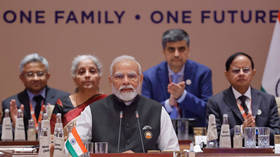World heard ‘echo of Global South’ at G20 – Modi
India’s presidency of the group has amplified the views of the developing world, the prime minister has insisted
Indian Prime Minister Narendra Modi told G20 leaders on Wednesday that the whole world could hear the “echo of the Global South” during his country’s presidency of the group.
Delivering the opening remarks at a G20 virtual summit, Modi claimed that the “message of inclusivity” that the group of leading economies had given to the whole world was “unprecedented.” He added it was “a matter of pride” for New Delhi that the African Union had joined the G20 as a permanent member during India’s presidency.
“The G20 has renewed faith in multilateralism. Together we have given direction to multilateral development banks and global governance reforms,” Modi stated.
The Indian leader further called for reforms to global economic and governance structures, to make them “bigger, better, effective, representative, and future-ready,” while ensuring timely and affordable assistance to countries in need. Modi also urged the implementation of action plans to accelerate the 2030 sustainable development goals.
The virtual G20 summit was held amid the humanitarian crisis in Gaza. Modi welcomed the news of a four-day ceasefire agreed by Israel’s cabinet one day before the event, seen as a chance to release dozens of hostages taken by Hamas militants and to deliver aid to the Palestinian enclave. The Indian prime minister also urged G20 leaders to work together to ensure the Israel-Hamas war does not expand in the region.
Modi used his closing remarks to suggest that G20 leaders should reach a consensus on key issues regarding the conflict, including the condemnation of terrorism, violence, and civilian deaths. Global leaders also broadly agreed on ensuring efficient humanitarian help and resolving the decades-long conflict diplomatically through a two-state solution.
Consensus has been a prominent theme during India’s G20 presidency after the adoption of the Delhi Declaration in September. The document focused on inclusive and sustainable growth, the development and climate agenda, and the need for reforms to multilateral institutions.
However, it was also notable for its diversity of voices and positions on the Ukraine conflict. Unlike the Bali Declaration adopted in 2022, the document did not mention Russia in relation to the hostilities, but did call on all nations to respect the territorial and political integrity of other states.
India’s G20 sherpa, Amitabh Kant, said in September that a consensus on the declaration had been reached after more than 200 hours of intense negotiations. Diplomats held 300 bilateral meetings and circulated 15 drafts with their counterparts, with variations of paragraphs related to the Ukraine conflict, to produce a document on the very first day of the summit.
India assumed the G20 presidency from Indonesia last year against the backdrop of major geopolitical tensions between key members. On Wednesday, Modi stressed that New Delhi had sought to make the group inclusive, ambitious, action-oriented, and decisive, declaring that “over the past year, together we have realized that vision.”
Where India Meets Russia – We are now on WhatsApp! Follow and share RT India in English and in Hindi
You can share this story on social media:









Comments are closed.